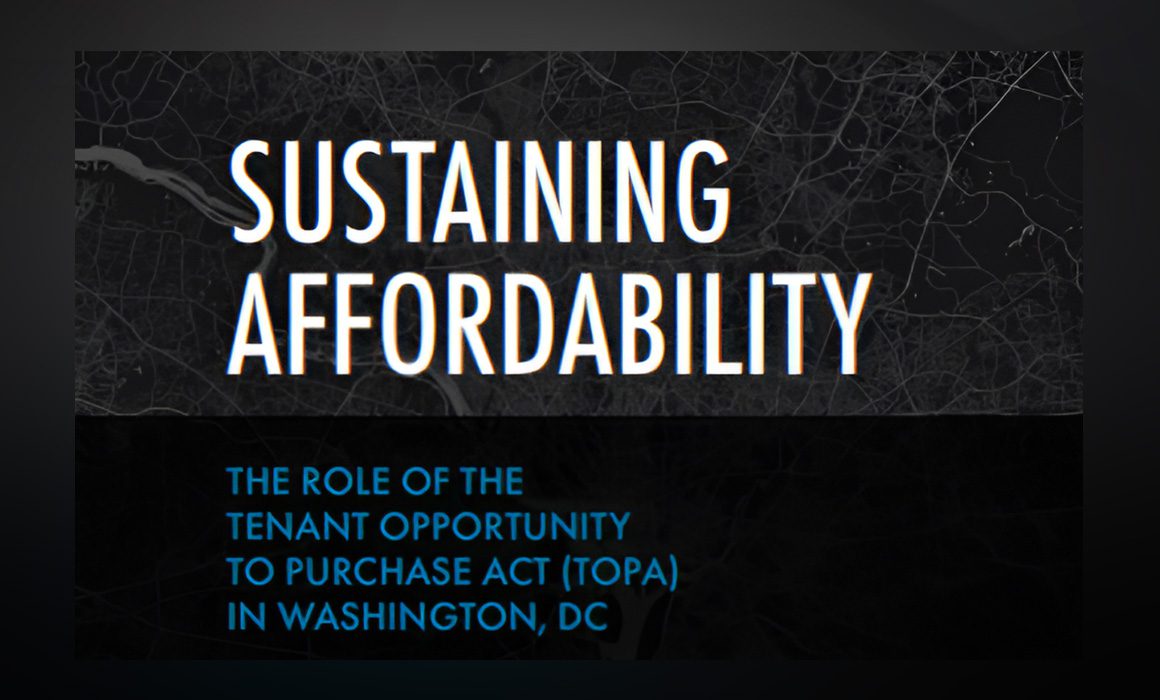DC’s TOPA law enabled tenants to negotiate better housing conditions and create more than 19,000 units of affordable housing according to new study
The Coalition for Nonprofit Housing and Economic Development (CNHED), in collaboration with The Council of the District of Columbia, recently published a comprehensive study on DC’s Tenant Opportunity to Purchase Act entitled Sustaining Affordability: The Role of TOPA in DC Housing. Results from this study highlight the law’s effectiveness in creating opportunities for tenants to negotiate more affordable, higher quality housing for themselves and avoid displacement. The study found that:
- TOPA has enabled the development or preservation of 16,224 affordable housing units.
- TOPA has effectively given tenants a voice in property sale negotiations to help shape what happens to their housing.
- Despite its success, TOPA faces challenges such as attempts by landlords to evade TOPA, the timeline of sales, and the need for tenant education and additional funding for projects.
Elin Zurbrigg, Mi Casa’s Deputy Director noted, “The study’s findings confirm what we’ve seen first-hand through our work. When DC renters–the majority of whom are Black and Brown–are supported to use their TOPA rights, they can negotiate better living conditions, prevent displacement, and keep their housing and DC’s neighborhoods affordable and diverse, ensuring future equity and inclusion throughout the District.” In addition to findings about TOPA’s impact, the study recommends reforms to bolster tenant rights, improvements in property owner accountability, increases in tenant access to legal and technical assistance, and a realignment of the Department of Housing and Community Development’s funding priorities for strengthening affordable housing preservation as actions that can strengthen TOPA going forward.
The D.C. Rental Housing Conversion and Sale Act of 1980 established what we know today as the Tenant Opportunity to Purchase Act. Before TOPA was enacted, the DC government acknowledged findings that DC was facing a continued housing crisis and that the rapid conversion rate of rental housing into market-rate condominiums and cooperatives was creating disproportionately high housing costs and a loss of additional affordable rental housing stock especially for lower income tenants, elderly tenants and tenants with disabilities. In response, TOPA was enacted with several explicit purposes:
- To preserve rental housing which can be afforded by lower income tenants in the District.
- To prevent lower income elderly tenants from being involuntarily displaced when their rental housing is converted.
- To provide incentives to owners who convert their rental housing to enable low income non-elderly tenants to continue living in their current units at costs they can afford.
- To provide relocation housing assistance for lower income tenants who are displaced by conversions;
- To encourage the formation of tenant organizations;
- To balance and, to the maximum extent possible, meet the sometimes conflicting goals of creating homeownership for lower income tenants, preserving affordable rental housing, and minimizing displacement;
This study comes at a critical time. While the findings emphasize TOPA as a critical tool for preventing the displacement of lower income renters, it also highlights opportunities to strengthen TOPA. Gaps in funding and political support for TOPA has made it more difficult for tenants to access their TOPA rights and developers have been fighting to carve out exemptions to TOPA even as other cities use DC’s TOPA law as a model housing solution to their own persistent housing crises. Mi Casa is committed to advocating for the strengthening, implementation, and funding of TOPA. We will continue to advocate for fully funding programs that support tenants in utilizing their TOPA rights to preserve affordable housing including the Housing Production Trust Fund, the Preservation Loan Fund and the First Right to Purchase Program. Additionally we support robust funding for the neighborhood based activities programs that provide critical technical assistance to tenants whose buildings are up for sale.
Tenants can go to micasa-inc.org/know-your-topa-rights to learn more about their TOPA rights or contact Housing Counseling Services or the Latino Economic Development Center for support in exercising their TOPA rights.
About Mi Casa, Inc.
Founded in 1992, the mission of Mi Casa, Inc., a 501(c)(3) nonprofit located in Washington, D.C., is to provide quality affordable housing to low- and moderate-income households in the Washington D.C. area to foster healthy, thriving and diverse neighborhoods. These affordable rental units are among the more than 2,000 affordable units Mi Casa, Inc. has produced and preserved since its founding. Learn more at micasa-inc.org
